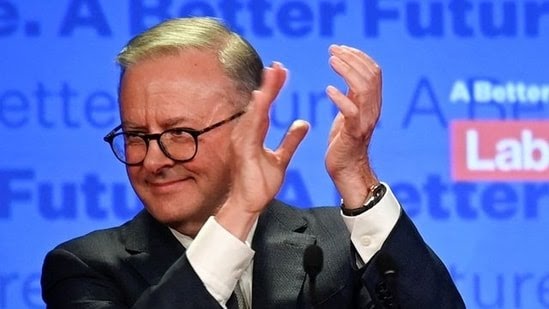Australia’s center-left labor party emerged victorious in the just concluded election, with Anthony Albanese, 59, set to become the new prime minister. The conservative party lost the election after nearly a decade-long rule.
Early election results with 60% of votes counted showed the labor is winning in 72 seats, the conservative coalition in 55, and others in 11 seats. The labor party would require 76 seats to form the government, by itself or with the support of independents or minor parties.
Addressing the nation after the election victory on Saturday, Albanese said, “It says a lot about our great country that a son of a single mom who was a disability pensioner, who grew up in public housing can stand before you tonight as Australia’s PM.” Earlier during his campaigns, emphasizing his humble upbringing, he often described himself as the only candidate in the 121-year history of Australia carrying a non-Anglo Celtic name.
He also vouched that by 2030 he will bring greenhouse gas emissions down by 43% and realize net-zero by 2050. There is an expectation that the Labor party might fulfill its promises of extending the social safety net and offering more financial assistance.
Relationship with China
Though Albanese has asserted that there would not be any change in Australia’s China policy, there is a perception that the Labor party might want to restore relations with China. In fact, the Labor government in Victoria went into a Memorandum of Understanding (MoU) with China back in 2018 to be part of China’s Belt and Road initiative. However, it was scrapped by the Morrison government, calling it inconsistent with Australia’s foreign policy. On the other hand, considering China’s potential military presence on the Solomon Islands, the Labor party has also called for a Pacific defense school to train neighboring armies.
India ties
Soon as the news of the Labor party winning broke, the Australian high commissioner in New Delhi, Barry O’Farrell, was quick to say that PM-elect Anthony Albanese is no stranger to India. He recollected Albanese’s visit to India in 1991 as a backpacker with his girlfriend, then in 2018, heading a parliamentary delegation.
During the campaign, Albanese made overtures to the local Indian community in Australia. He also took part in an event hosted by the Hindu Council of Australia. Though his political rival Scott Morrison enjoyed better ties with India and the Indian community, Albanese too vouched to strengthen strategic, economic, and people-to-people ties with the country.
However, back in 2011, the center-left Labor government in Australia had refused to sell Uranium to India despite a waiver from the Nuclear Suppliers Group. Now, nearly a decade later, the Labor party is back in power. Whether it would prefer India over China, or maintain a fine balance in its ties between both nations, is something to wait and watch.
Quad
On Tuesday, PM-elect Anthony Albanese will be heading to Tokyo to attend the Quad summit with India PM Modi, Japanese PM Fumio Kishida, and US President Joe Biden. Albanese and PM Modi would interact on several key subjects, including Ukraine. The leaders will also review India-Australia’s Comprehensive Strategic Partnership and the recently signed India-Australia Economic Cooperation and Trade Agreement.
Image Source: Reuters

